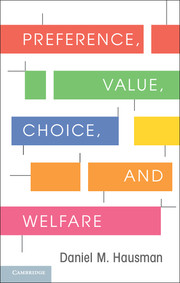Book contents
- Frontmatter
- Contents
- Figures
- Preface
- 1 Preferences, Comparative Evaluations, and Reasons
- Part I Preferences in Positive Economics
- Part II Preferences, Welfare, and Normative Economics
- Part III Psychology, Rational Evaluation, and Preference Formation
- 9 The Psychology of Choice
- 10 Constructing Preferences
- 11 Conclusions
- References
- Index
11 - Conclusions
from Part III - Psychology, Rational Evaluation, and Preference Formation
Published online by Cambridge University Press: 05 June 2012
- Frontmatter
- Contents
- Figures
- Preface
- 1 Preferences, Comparative Evaluations, and Reasons
- Part I Preferences in Positive Economics
- Part II Preferences, Welfare, and Normative Economics
- Part III Psychology, Rational Evaluation, and Preference Formation
- 9 The Psychology of Choice
- 10 Constructing Preferences
- 11 Conclusions
- References
- Index
Summary
I began by distinguishing four conceptions of preference: favoring, enjoyment comparison, choice ranking, and comparative evaluation, which may be total, as in economics, or “overall” and hence partial, as in everyday usage. In taking preferences to be complete and stable, economists are often inclined to regard questions about their provenance and modification as outside of the purview of economics and indeed as beyond rational scrutiny. They are tempted to think of preferences as mere matters of taste. These views were repeatedly criticized. Enjoyment comparisons, in contrast to total comparative evaluations, do not determine choices and for that reason cannot constitute the concept of preferences that economists employ. Nor (as argued in Chapter 3) will preferences defined by choices serve the purposes of economists, because such preferences only rank the immediate objects of choice and their relation to choice is independent of belief.
As argued in the first six chapters, the concept of preferences as comparative evaluations is central to positive economics as well as to much of everyday talk concerning preferences. Experimental demonstrations of the volatility of preferences discussed in Chapter 9 show that social scientists have to choose between taking preferences to be total but context-dependent evaluations (which is the view I have defended) and taking preferences to be stable but only partial evaluations that compete with other factors in the determination of choices.
- Type
- Chapter
- Information
- Preference, Value, Choice, and Welfare , pp. 133 - 138Publisher: Cambridge University PressPrint publication year: 2011



